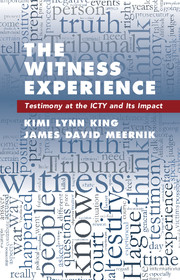Book contents
- Frontmatter
- Contents
- List of Figures page
- List of Tables
- Acknowledgments
- 1 Introduction to the Survey and Survey Methodology
- 2 Exploring the Gender, Ethnicity, and Trauma Characteristics of the Witness Sample
- 3 The Witnesses and Their Encounter with International Justice
- 4 The Witnesses and Human Security: The Social, Economic, and Security Consequences of Testimony
- 5 The Impact of Testifying
- 6 Perceptions of Justice
- 7 Conclusions
- Bibliography
- Index
7 - Conclusions
Published online by Cambridge University Press: 11 November 2017
- Frontmatter
- Contents
- List of Figures page
- List of Tables
- Acknowledgments
- 1 Introduction to the Survey and Survey Methodology
- 2 Exploring the Gender, Ethnicity, and Trauma Characteristics of the Witness Sample
- 3 The Witnesses and Their Encounter with International Justice
- 4 The Witnesses and Human Security: The Social, Economic, and Security Consequences of Testimony
- 5 The Impact of Testifying
- 6 Perceptions of Justice
- 7 Conclusions
- Bibliography
- Index
Summary
Witnesses are indispensable for establishing truth and justice in post-conflict environments. While scholars and practitioners are now studying in earnest the impact of testifying on witnesses’ lives, there is still much that remains to be explored and better understood. This study explored how a sample of 300 witnesses perceives they have been affected before, during, and after the process of testifying at the International Criminal Tribunal for the Former Yugoslavia. This chapter presents our conclusions based on the most important findings from the 300 interviews conducted, and offers both recommendations for further advances in research and practical advice for international and national courts on working with witnesses. By delving deeper into witnesses’ motivations for testifying, human security concerns, their psychological and physiological health, and their overall perception of international justice, we hope that the results of this study will facilitate the further development of best practices in witness security, health, and the overall witness experience throughout the testimonial process. We also have sought to provide a more comprehensive understanding of what it means to bear witness. We hope that these findings can be used to advance theory development in such areas as international judicial research, studies of witnesses in both international and national courts, and transitional justice more generally.
We organize this chapter by theme. We begin by revisiting the three theoretical themes or lenses – gender, wartime trauma, and ethnicity – we used throughout this study to comment on the importance of the findings for both theory and practice. We also offer recommendations germane to these particular subjects. Subsequently, we discuss findings related to human security, the psychological and physiological impact of testifying, and witnesses’ perceptions of their own contributions to international justice and the work of the ICTY.
GENDER ISSUES
The overall number of women who testified before the ICTY is relatively small (approximately 13%), with disproportionate numbers represented in sexual violence cases. Our study purposely oversampled women to ensure sufficient participation of them in the study, and it will be important in future studies to continue to ensure robust numbers of women in surveys, given that they are not called to testify nearly as frequently as men.
- Type
- Chapter
- Information
- The Witness ExperienceTestimony at the ICTY and Its Impact, pp. 178 - 196Publisher: Cambridge University PressPrint publication year: 2017
- 1
- Cited by



